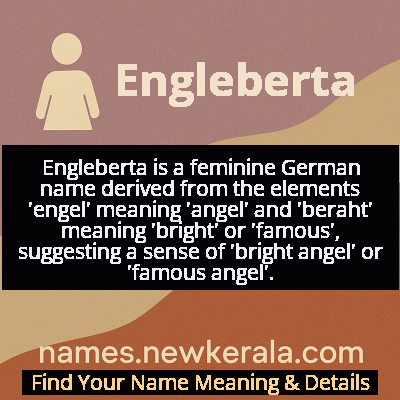Engleberta Name Meaning & Details
Origin, Popularity, Numerology Analysis & Name Meaning of Engleberta
Discover the origin, meaning, and cultural significance of the name ENGLEBERTA. Delve into its historical roots and explore the lasting impact it has had on communities and traditions.
Name
Engleberta
Gender
Female
Origin
German
Lucky Number
8
Meaning of the Name - Engleberta
Engleberta is a feminine German name derived from the elements 'engel' meaning 'angel' and 'beraht' meaning 'bright' or 'famous', suggesting a sense of 'bright angel' or 'famous angel'.
Engleberta - Complete Numerology Analysis
Your Numerology Number
Based on Pythagorean Numerology System
Ruling Planet
Saturn
Positive Nature
Ambitious, efficient, realistic, and authoritative.
Negative Traits
Materialistic, stressed, confrontational, and can be overly ambitious.
Lucky Colours
Dark blue, black.
Lucky Days
Saturday.
Lucky Stones
Blue sapphire, amethyst.
Harmony Numbers
2, 4, 6.
Best Suited Professions
Business leaders, managers, financial services, law enforcement.
What People Like About You
Leadership, determination, organizational skills.
Famous People Named Engleberta
Engleberta of Bavaria
Noblewoman
Influential medieval countess and diplomatic mediator
Engleberta of Nassau
Aristocrat
Successful regent who maintained political stability in the Netherlands
Engleberta Schmidt
Educator
Pioneer in women's education reform in 19th-century Prussia
Name Variations & International Equivalents
Click on blue names to explore their detailed meanings. Gray names with will be available soon.
Cultural & Historical Significance
Extended Personality Analysis
Individuals named Engleberta typically exhibit a unique blend of traditional values and intellectual curiosity. The name's meaning suggests someone who combines spiritual depth with practical intelligence, often serving as a calming presence in turbulent situations. They tend to be methodical thinkers who approach challenges with both emotional intelligence and logical analysis. Historically, women bearing this name have been noted for their strong sense of duty, reliability, and ability to maintain traditions while adapting to changing circumstances. The personality traits associated with Engleberta include exceptional organizational skills, attention to detail, and a natural inclination toward caregiving and mentorship. These individuals often become the family historians or community pillars who preserve cultural traditions and family lore. Their strength lies in balancing compassion with firm principles, making them respected advisors and trusted confidantes in both personal and professional relationships.
Modern Usage & Popularity
In contemporary naming practices, Engleberta remains an exceptionally rare choice, primarily preserved within specific German-speaking families as a heritage name. Modern usage trends show that the name appears most frequently in Bavaria and Austria, where traditional Germanic names have experienced mild revivals as part of cultural preservation movements. According to German governmental statistics, Engleberta appears in birth registrations fewer than five times per year nationwide, placing it among the rarest of traditional German names. The name's modern appeal lies in its uniqueness and strong cultural roots, attracting parents seeking distinctive names with historical significance. Some modern Englebertas choose to use contemporary nicknames like 'Engie,' 'Bertie,' or 'Ella' to make the name more accessible in daily life. The name's rarity ensures that bearers stand out while maintaining connection to a rich Germanic cultural heritage that spans centuries.
Symbolic & Spiritual Meanings
The symbolic resonance of Engleberta extends beyond its literal translation to encompass broader themes of enlightenment, protection, and moral guidance. The name symbolizes the human capacity to bridge earthly existence with higher spiritual understanding, representing individuals who bring clarity and wisdom to complex situations. Metaphorically, Engleberta embodies the concept of 'lumen naturale'—the natural light of reason and intuition that guides human understanding. In artistic and literary contexts, the name often represents characters who serve as moral compasses or transformative figures who illuminate truth and foster reconciliation. The symbolic meaning also includes themes of cultural preservation, as the name itself carries centuries of Germanic history and tradition. For modern bearers, Engleberta symbolizes a connection to ancestral wisdom while embracing contemporary values of intellectual curiosity and ethical leadership in an increasingly complex world.

